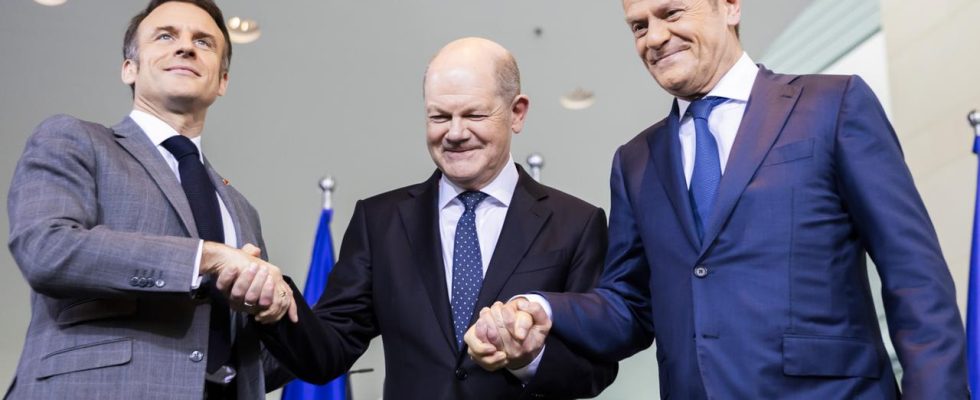analysis
The relationship between Chancellor Scholz and French President Macron has recently been characterized by distrust. At the special summit of the so-called Weimar Triangle, Germany, France and Poland are demonstratively united.
It should be the symbolic image of this meeting: Olaf Scholz, Donald Tusk and Emmanuel Macron step in front of the lecterns after the press statement, hold hands tightly and smile into the cameras. Scholz is practically beaming. The meeting was a very important sign of unity, the Chancellor told journalists. They stand “closely and unwaveringly at Ukraine’s side.”
Emmanuel Macron added: “We are united, determined, we will do everything so that Russia does not win the war.” And Polish Prime Minister Tusk adds: The nasty rumors about differences of opinion are not true. No questions from journalists were allowed. Nothing should tarnish the image of European unity and unity.
Obtain ammunition from all over the world market
The three heads of state and government decided, among other things, that ammunition should be procured on the entire global market. The production of military equipment is being expanded and there should be progress in long-range rocket artillery. At the EU level, for example, they want to use profits from frozen Russian assets to buy weapons for Ukraine.
It seems as if the three politicians have done a lot of things right this time. The Weimar Triangle can be exactly the right round of unity in the EU that is needed now: Germany as an economic power, France as a nuclear power and UN Security Council member and Poland as the leading state in Eastern Europe. 188 million people, more than 40 percent of the EU population – decisions can be made quickly between three politicians in this way, which can later be extended to the entire EU. But unfortunately, the Franco-German disagreement overshadowed a lot of things beforehand.
A swipe at Scholz
Just the evening before, French President Emmanuel Macron gave a big TV interview about the Ukraine war – broadcast at prime time at 8 p.m. “Anyone who excludes options does not choose peace, but defeat,” said Macron. With the swipe at the Chancellor, the French president is once again defending his move not to rule out NATO ground troops in Ukraine. “If the situation worsens, we must be ready so that Russia never wins,” says Macron.
Sentences that may have caused anger in the Federal Chancellery. Scholz had just explained why Germany didn’t want to send “Taurus” cruise missiles when Macron put him under pressure with ground troops, which Scholz had to recapture. Scholz also repeatedly publicly calls on other countries to make more financial commitment to Ukraine – including France. It is spending less money on Ukraine, but points out that it has delivered very effective weapons systems. A week-long back and forth of mutual accusations.
Macron interview also addressed to Putin
In expert circles, Macron is receiving positive feedback for his television appearance. Leaving Putin in the dark, becoming more unpredictable as Europe and refusing to let anyone see his hand – that’s what experts see as the right way to deal with the Russian autocrat. The president speaks with words like “victory” and “defeat”, a credibility of Europe that would drop “to zero” if Russia won the war.
“The interview was also aimed at showing Putin that Europe is capable of defending itself,” says German-French political scientist Sophie Pornschlegel from the Jacques Delors Institute in Brussels. “And that we don’t say we won’t put this option on the table because it goes too far for us.”
Olaf Scholz, on the other hand, recently explained important questions not in a prime-time television interview, but at a journalists’ conference, in a high school or under pressure from opposition members in the German Bundestag. Scholz was unable to get ahead of the wave of pressure from outside and was instead pushed into the role of brakeman.
He himself or members of his SPD parliamentary group would call it “prudent”, but the public got the impression that he was being driven from outside – by experts, MPs from his own government coalition, but also by external actors like that Russian president (keyword: “Taurus” wiretapping affair) or now the French president (keyword: ground troops).
Distrust between Germany and France
“German-French relations were never easy,” says political scientist Pornschlegel. “France usually presented very ambitious visions that perhaps went a little too far, and then Germany said: ‘We have to approach this a little more pragmatically.’ But Germany never said no.”
She no longer sees this dynamic, says Pornschlegel. There is now a great deal of mistrust between the countries and especially between the decision-makers. Both Macron and Scholz tried to dispel this impression of distrust today. Solidarity and joint action are essential to defend peace and freedom in Europe. Scholz said: “More than ever, our unity is our strength.”
Explicit thanks from Tusk
The experienced Polish Prime Minister Donald Tusk may also have played an important role in smoothing over the disagreements between Germany and France. Scholz must have liked Tusk’s explicit thanks to the Chancellor for not hesitating. This is grateful support in Scholz’s fight against the impression that he was just a hesitant and hesitant in the Ukraine war.
After weeks of argument, the three men achieve the desired image of unity and unity. We will see each other again next week at the EU summit, says Scholz. We can only hope that old rifts between Germany and France will not reopen by then.
Lea Kiehlneker, ARD Berlin, tagesschau, March 15, 2024 5:58 p.m

